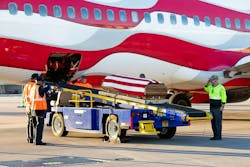More than Cargo: Ground Handling with Dignity and Compassion
This article is part of Ground Support Worldwide’s “Handling with Compassion” series, which looks at the respectful transportation of human remains, including military human remains.
Ramp agents are responsible for unloading and loading an airplane. That’s included in their job description. What might not be specified in the job description is that sometimes the cargo that they are unloading or loading could be someone’s loved one being flown to their final resting place.
In 2023, Southwest Airlines transported almost 21,500 human remains (HR). Of those, about 250 were military human remains (MHR). All of them were someone’s mother, father, daughter or son, says Anne Lott, senior manager, Cargo Customer Care, Southwest Airlines. And, that’s one reminder shared with Southwest ramp agents as they undergo routine training on how to handle both HR and MHR with dignity and compassion.
The job at hand, however, is anything but routine. HR and especially MHR transports require the coordination of many details behind the scenes.
Southwest Cargo specifies human remains, other than cremated remains, must be adequately secured in a casket, an approved metal container or a combination unit. If the remains are in a casket, the casket must be enclosed in an outside shipping container of wood, canvas, plastic or paper-board construction that has at least six handles and sufficient rigidity and padding to protect the casket from damage with ordinary care in handling.
According to Bill Merda, senior cargo customer service manager, Southwest Airlines, the majority of HR transports involve a casket or an “air tray” – an air shipping tray that has a wood base and handling straps.
During the loading or unloading of non-military human remains, other servicing of the aircraft occurs simultaneously. There are no planeside honors, and hearse access is not permitted. Funeral homes tender remains at the cargo facility where employees move them to the aircraft to be transported. When the remains arrive in the destination city, cargo agents will retrieve the remains, moving them to the cargo facility where a funeral home will be on hand to complete the journey.
MHR Before Departure
When a military human remains shipment is booked, Lott says an email is sent to a wide variety of work groups within Southwest, including Network Operations Control, crew coordinators, teams at the origin and destination airport, and various managers and supervisors.
On the day of the transport, Merda says, “supervisors review with the ramp agents the proper handling of these special transports and what to anticipate before, during and after the process.”
“Because we have more than 8,200 employees who have served or are serving in the military, we take so much pride being able to provide this service to honor fallen military members,” he adds.
Cargo supervisors handle most of the day-of coordination with the funeral home, military escorts, and all of the various teams involved with the flight including the airline’s ground operations teams.
The airport authorities and first responders are notified, and adjacent airport terminal gates are left unoccupied if possible. Depending on the airport, the fire department may arrange a water canon salute and/or a color guard, generally at arrival. These details are all part of the planning.
MHR Departure
When departure time nears and servicing of the aircraft has been completed, the MHR will arrive planeside. Here, either the military honor guard or Southwest ramp agents will begin the process of transferring the remains into the aircraft. At this point, Merda says, “we implement a ‘quiet environment’ with all non-essential equipment being turned off, radios are silenced, and employees pause to show their respect.”
With the large number of veterans and military members employed by Southwest Airlines, Merda says it is common for employees from other departments to be present during the handling of MHR to show their respect.
Prior to departing the gate, he says “often the captain will make an announcement to the passengers informing them of the precious cargo they’re transporting that day and what to expect before and after the flight. It’s not unusual for those with military experience to be seen saluting from inside the cabin.”
MHR Arrival
When the aircraft arrives at its destination, the military escort is accompanied to the ramp to observe the dignified transfer of the remains. If a military honor guard is present, they will drape the casket with the American flag then transfer the MHR from the belt loader to the hearse or MHR cart. If family members are traveling with the MHR or present for the arrival, Southwest teams will escort them to the ramp to observe the transfer. No other aircraft servicing commences until the MHR is transported from the gate area.
Depending on airport regulations, a military honor guard can be present at both origin and destination stations to assist with the transfer of the remains. Merda says the airline works with the local airports to ensure each MHR is transported in the most dignified manner to honor their sacrifice, whether that’s ensuring a hearse and honor guard are staged on the ramp to receive the remains from the aircraft or the MHR cart is at the gate and ready to move the shipment back to the cargo facility to be accepted by the funeral home.
Most people who observe the transporting of MHR probably won’t think about the process as it’s taking place or even afterward. Lott, Merda and their team members aren’t most people – they think about the process and all the details.
“I’m so proud of our teams for the care and dedication they have to ensuring the process is seamless,” Lott says.
Merda points out the logo of Southwest Airlines is a heart and concludes, “We take pride in being able to share a bit of our ‘Hearts’ to fallen heroes and their families.”
About the Author
Rebecca Kanable
Assistant Editor
Rebecca Kanable, a veteran journalist, worked with Endeavor Business Media's aviation group from 2021 to 2024 as assistant editor of Airport Business, AMT and Ground Support Worldwide. She previously worked for various publications, including trade magazines and newspapers.

